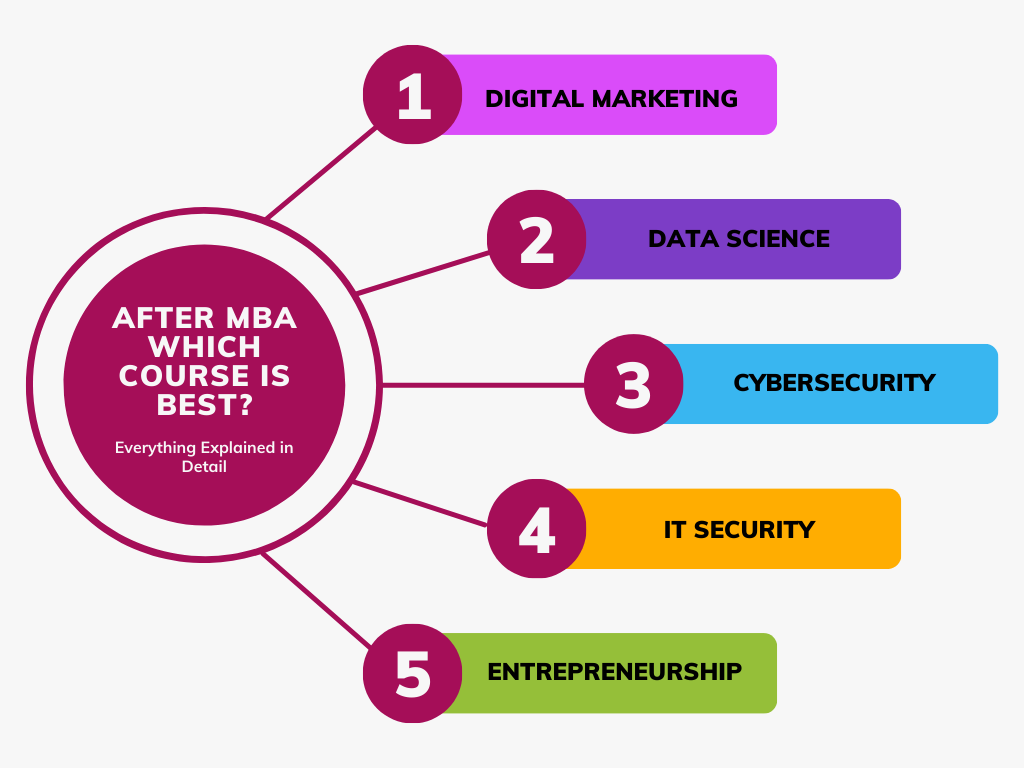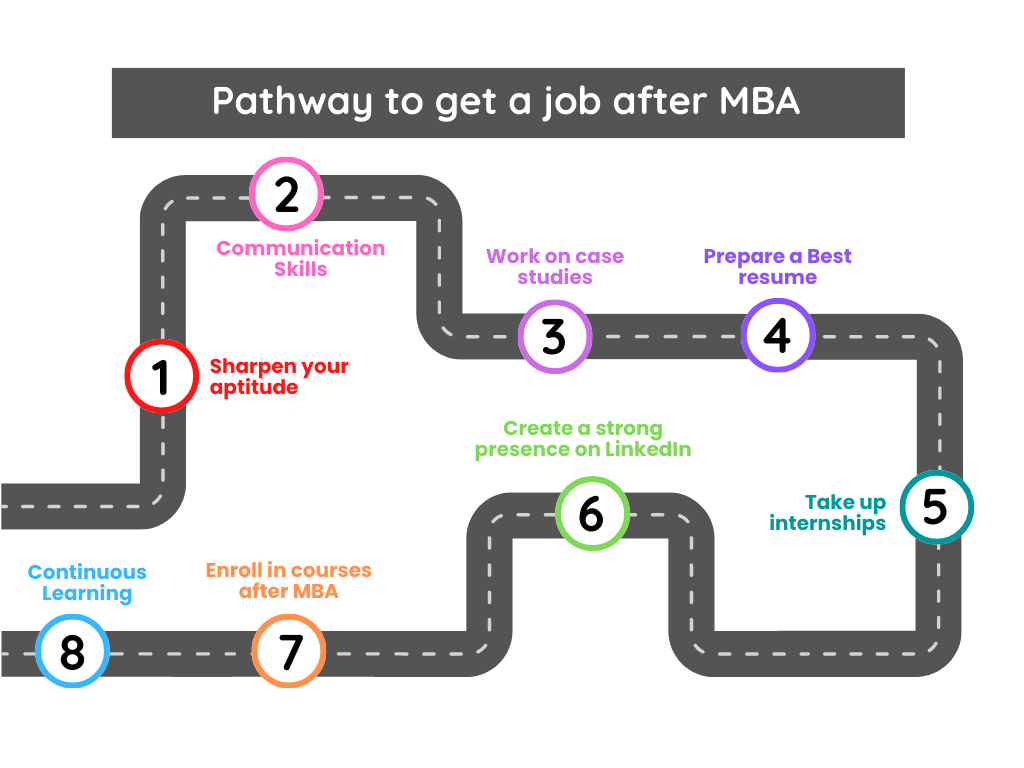
Do you know that more than 4 lakh individuals enroll in Master in Business Administration (MBA) courses every year in India? No doubt why MBA is very popular among students in India. Every other graduate irrespective of his/her educational background wants to switch to MBA. This guide covers all the roles you can choose as a career after MBA.
Once you pursue an MBA, the most important question arises: ‘What can I do after MBA?’ Before you figure out the answer to this question, you must know the various domains of the MBA.
MBA covers over 7 different domains related to business and management. These include:
- MBA in Finance
- MBA in Marketing
- MBA in Business Analytics
- MBA in Human Resources
- MBA in Operations Management
- MBA in Management Consulting
- MBA in International Business
Based on these various MBA domains, you can look for various career opportunities after MBA. Without further ado, let’s discuss the top career after MBA!
ALSO READ: What to do after B.Tech
Why choose MBA?

An MBA course Program can enhance your marketability as a professional and increase the quality and quantity of job opportunities in the industry if you have MBA Degree in your pocket.
What is the scope of an MBA?
The future looks quite promising for candidates who pursue MBA courses. The scope of the post-graduate course is mentioned below:
- Job opportunities in big consulting firms:
As mentioned earlier, you can land high-paying consulting jobs in big companies such as Bain and Co, JP Morgan and Chase, McKinsey and Co, etc. by becoming a management consultant. You can also become an investment banker and work in a consulting firm.
- Career opportunities in finance and banking:
Through MBA, you can also establish a rewarding career in the finance and banking sector. You can do so by earning an MBA in finance. By doing so, you become eligible for competitive salaries.
- First step to entrepreneurship:
It has become a major trend to pursue entrepreneurship after pursuing an MBA postgraduate degree. You can do so by gaining an MBA in entrepreneurship or business operations. This way, you can start your own business venture.
What are the career opportunities after MBA?
MBA is a very flexible 2-year-long postgraduate program that allows candidates to explore various industries such as marketing, business operations, management, risk analysis, human resources, consulting, investment banking, etc. If you wish to build a solid career in the business management industry, you must be aware of the most in-demand career after MBA.

Career after MBA: Jobs, Scope, Salary
The various job roles related to opportunities after MBA are mentioned below:
Finance Manager/Financial Analyst:
After pursuing an MBA in finance, you can become a Finance Manager or Finance Analyst. You work to analyze the company’s fiscal year financial reports, forecast industry/economic trends, analyze risk factors, look for investment opportunities and manage the investment portfolio.
Average salary: Rs. 13 LPA
Marketing Manager:
You can work as a Marketing Manager in business firms after pursuing an MBA in marketing. Your job as a Marketing Manager is to increase brand awareness. You then run ad campaigns to do so along with developing marketing strategies for products and services.
Average salary: Rs. 7.4 LPA
Management Consultant:
Consulting job opportunities after pursuing MBA are the most popular career opportunities after MBA. Thanks to the competitive salaries. As a Management consultant, your job is to identify bottlenecks in businesses, solve problems, improve business growth, and make suggestions to bring tangible changes/growth in the business.
There are many big-sized consulting firms such as McKinsey and Co, Bain, BCG, JP Morgan and Chase, Deloitte, KPMG, etc., that are on a constant lookout for management consultants.
Average salary: Rs. 23.9 LPA
Investment Banker:
When companies be they midsize, large-sized, or even startups are on the lookout for investing opportunities, investment bankers can help them do so. As an Investment Banker, you provide financial services such as providing investment advice and reviewing debt structure to build businesses.
Average salary: Rs. 4.5 LPA
Human Resource Manager:
When you pursue an MBA in human resources, you can then apply for HR jobs in various organizations. The duty of an HR is to carry out recruitment, take interviews, and act as a medium between the management and employees.
Average salary: Rs. 7 LPA
Business or Data Analyst/Manager:
By becoming a Data/Business Analyst, you take charge to identify current trends in any kind of data of a business organization such as sales, marketing, operations, inventory, etc., and then explain to the stakeholders what could be done to enhance business growth.
The job includes working with/cleaning raw data and making sense of it.
Average salary: Rs. 8 LPA
Product Manager:
Product Manager has been the most popular and high-paying career after MBA. As a product manager, you have to work in coordination with the design (UI/UX) and engineering team to build a product to life. The product could be a physical one, software, etc., according to the customer’s needs.
Average salary: Rs. 16.3 LPA
International Business Manager:
A lot of multinational companies (MNCs) require their business operations to be carried out on a global level. This is where you can apply as an International Business Manager and handle all the global operations, business expansion and carry-out cross-cultural operations/activities.
Average salary: Rs. 12 LPA
Retail Manager:
As the name suggests, you can work for a large retail chain such as Walmart to manage all the retail operations, such as looking out for the sales made, handling inventory and keeping the goal of customer satisfaction in mind.
Average salary: Rs. 4.2 LPA
Information Technology Director:
An Information Technology director is responsible for taking care of all the in-house IT-related tasks and managing the technologies involved. You can earn a really good package as an IT director.
Average salary: Rs. 41 lakh
What are the best technical courses after MBA?

What are the best courses after MBA?
It is always a great idea to enhance and grow your skills after pursuing an MBA. You can further specialize in your domain to become the most in-demand professional in the industry.
You can pursue the following best courses after MBA:
Digital Marketing:
After gaining an MBA in marketing, you can further specialize in working with SEO, running ad campaigns, learn in-depth about the Facebook Ad Library and social media in general to solidify your knowledge/skills in the domain of digital marketing. You can look for various digital marketing certifications available online.
Data Science:
After getting an MBA in Business/Data Analytics, you can further strengthen your knowledge in the data science domain by learning more about predictive analysis, regression, etc. You can do so by gaining a Data Science certification from a renowned platform.
Cybersecurity:
If you’re stuck with the question of which course is best after MBA, you can choose cybersecurity certifications to become one of the most highly-paid professionals in the IT domain. You can pursue cybersecurity certifications such as Certified Ethical Hacker (CEHv12), CompTIA CySA+, CompTIA PenTest+, etc., to become a Cybersecurity Analyst, Penetration Tester, Ethical Hacker and take up many other roles.
You can then learn how to protect digital environments from cyberattacks. If you’re interested in diving deep into cybersecurity roles, you can check out our Cybersecurity Master’s program. You can learn directly from Cybersecurity Engineers from scratch.
IT Security:
If you wish to enter the network infrastructure domain of the IT industry, picking up a good IT Security course can make you shine in the industry. One of the best ways to do it is to learn about firewalls. You can learn about Palo Alto, Checkpoint, etc.
Check out for more info here.
Entrepreneurship:
If you’re more business-driven and want to develop a startup, you can learn more about business management and entrepreneurship through various business certifications.
ALSO READ: Best Online Courses After MCA/BCA
What is the Scope of these Courses after MBA Completion?
After pursuing a technical course after MBA, you can open the doorway to high-paying job opportunities in the tech industry. The future looks very promising for such candidates.
- Better job opportunities:
By adding an IT certification in domains such as IT security, cybersecurity, network infrastructure, etc., you can enhance your set of skills and land a broad spectrum of job opportunities in the tech industry.
- Globally-recognized certifications:
These IT certifications such as cybersecurity certifications by CompTIA, EC-Council, etc., are recognised globally. This can give you an edge over others while applying for a job.
- Gain specialization in your field of interest:
One of the top benefits of enrolling in a technical course after MBA is that you can showcase your enhanced set of skills by specializing in a domain. For instance, if you pursued an MBA in Business Analytics, you can then gain a certification in predictive analysis to strengthen your skills further.
Roadmap to get a job after MBA

Even if you enroll in an MBA program, it is just not enough to land a job in the market considering the competition. Therefore, it is important to do the following to land a job in the market:
- Sharpen your aptitude: You cannot just rely on the skills taught in the MBA program. It requires you to have good reasoning skills, aptitude, and general business understanding to land a job after MBA. You can work on solving guesstimate problems.
- Connect with people: It is important to connect with people related to the industry you aspire to get into. For instance, if you wish to enter the media industry, it will be fruitful for you to land jobs in that industry. You can ask for referrals as well.
- Work on case studies: While studying, it is crucial to work on a business problem to solve on your own. This will help you showcase your skills through your portfolio and add projects to it.
- Prepare a killer resume: After pursuing MBA, you can then prepare a resume including all the projects you have worked on.
- Take up internships: Taking up internships is the best way to get a job in the industry. Do make sure that you mention the internship experience in your resume.
- Create a strong presence on LinkedIn: In order to get noticed by the top-notch people in the industry, you must share your knowledge on LinkedIn. You can showcase the projects you worked on, various problems you faced during different business problems, how you tackled them, etc.
- Enroll in courses after MBA: Pursuing a course after MBA is a great way to specialize in an industry that you wish to enter. For instance, if you wish to dive deep into the data analytics part, you can take up the data analytics certification course after MBA. You can pursue many other courses after MBA in India.
Conclusion:
MBA is one of the most sought-after programs after graduation. People from various backgrounds want to pursue it. In this blog, we have discussed various career opportunities after MBA. We have also discussed after MBA which course is best.
It is always a great idea to pursue a specialization course after MBA to build a strong foundation of concepts related to your field of interest. You can browse various opportunities after MBA, including the IT industry.
At last, we have laid down a future-proof roadmap to land a job in the industry. Hope this guide helps you land a job after MBA!


